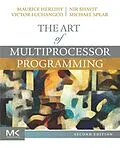The Art of Multiprocessor Programming, Second Edition, provides users with an authoritative guide to multicore programming. This updated edition introduces higher level software development skills relative to those needed for efficient single-core programming, and includes comprehensive coverage of the new principles, algorithms, and tools necessary for effective multiprocessor programming. The book is an ideal resource for students and professionals alike who will benefit from its thorough coverage of key multiprocessor programming issues. - Features new exercises developed for instructors using the text, with more algorithms, new examples, and other updates throughout the book - Presents the fundamentals of programming multiple threads for accessing shared memory - Explores mainstream concurrent data structures and the key elements of their design, as well as synchronization techniques, from simple locks to transactional memory systems
Autorentext
Maurice Herlihy received an A.B. in Mathematics from Harvard University, and a Ph.D. in Computer Science from M.I.T. He has served on the faculty of Carnegie Mellon University, on the staff of DEC Cambridge Research Lab, and is currently a Professor in the Computer Science Department at Brown University. Dr. Herlihy is an ACM Fellow, and is the recipient of the 2003 Dijkstra Prize in Distributed Computing. He shared the 2004 Gödel Prize with Nir Shavit, with whom he also shared the 2012 Edsger W. Dijkstra Prize In Distributed Computing.
Klappentext
The Art of Multiprocessor Programming, Second Edition, provides users with an authoritative guide to multicore programming. This updated edition introduces higher level software development skills relative to those needed for efficient single-core programming, and includes comprehensive coverage of the new principles, algorithms, and tools necessary for effective multiprocessor programming. The book is an ideal resource for students and professionals alike who will benefit from its thorough coverage of key multiprocessor programming issues.
- Features new exercises developed for instructors using the text, with more algorithms, new examples, and other updates throughout the book
- Presents the fundamentals of programming multiple threads for accessing shared memory
- Explores mainstream concurrent data structures and the key elements of their design, as well as synchronization techniques, from simple locks to transactional memory systems
Inhalt
1. Introduction 2. Mutual Exclusion 3. Concurrent Objects and Linearization 4. Foundations of Shared Memory 5. The Relative Power of Synchronization Methods 6. The Universality of Consensus 7. Spin Locks and Contention 8. Monitors and Blocking Synchronization 9. Linked Lists: The Role of Locking 10. Concurrent Queues and the ABA Problem 11. Concurrent Stacks and Elimination 12. Counting, Sorting and Distributed Coordination 13. Concurrent Hashing and Natural Parallelism 14. Skiplists and Balanced Search 15. Priority Queues 16. Futures, Scheduling and Work Distribution 17. Barriers 18. Transactional Memory
